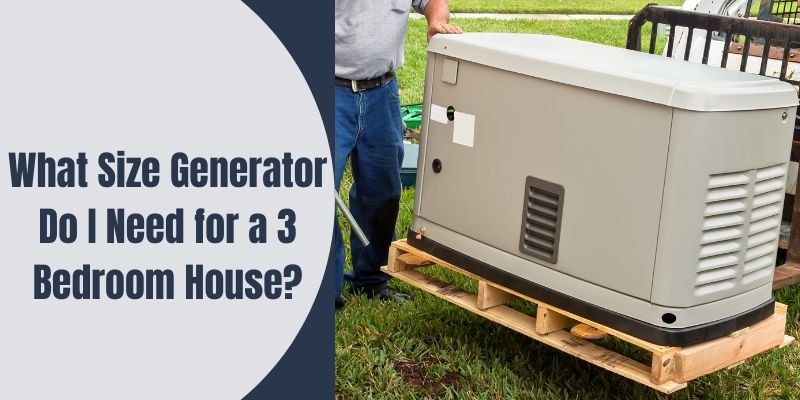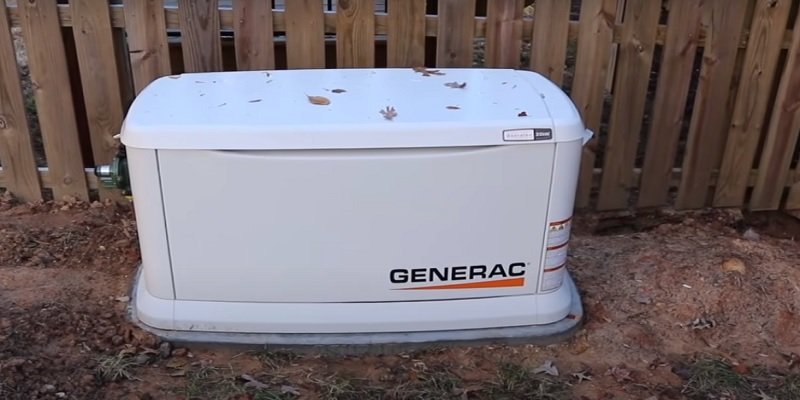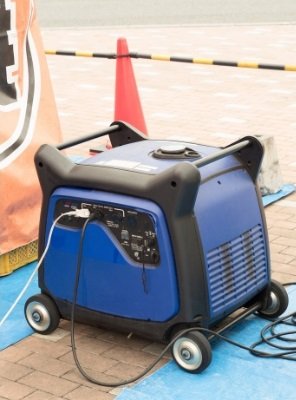Disclosure: This post contains affiliate links and I will be compensated if you make a purchase after clicking through my links. Learn More
When determining the size of the generator you need for a 3 bedroom house, several factors come into play. The first step is to assess your power requirements during a blackout. Make a list of essential appliances you want to run, such as refrigerators, lights, fans, heating systems, and electronics.
Next, identify the starting and running wattage of each appliance. You can find this information on the appliance’s nameplate or in the user manual. Sum up the running wattage and add the highest starting wattage to get the total wattage needed. It’s advisable to include a safety margin to ensure your generator can handle peak loads.

What Size Generator Do You Need for a 3 Bedroom House?
Generally, for a 3 bedroom house, a generator with a capacity of 5000 to 7500 watts should be sufficient to power the essential appliances. However, if you have additional high-power devices or want to ensure all your electrical needs are met, you might opt for a larger generator in the range of 9000 to 12000 watts.
To simplify the process, you can use a generator sizing calculator or consult a professional electrician.
Keep in mind that larger generators can be costlier and may consume more fuel. Balance your power needs with your budget and consider the frequency and duration of potential blackouts in your area.
Here’s a table showcasing the estimated wattage requirements for common household appliances:
| Appliance | Running Wattage | Starting Wattage |
| Refrigerator | 800 | 1600 |
| Microwave | 1000 | 1000 |
| Lights (10 bulbs) | 600 | – |
| Fans (3) | 300 | – |
| TV | 200 | – |
| Laptop | 50 | – |
| Heating System | 1000 | 2000 |
| Air Conditioner | 1500 | 2200 |
Running the Entire 3 Bedroom House on a Portable Generator
While a portable generator can provide power to your entire 3 bedroom house, it might have limitations based on its size and capacity. Portable generators are generally smaller and more suitable for powering essential appliances during a blackout, rather than handling the entire household’s power needs.
To determine if a portable generator can handle your entire 3 bedroom house, follow the steps outlined earlier to calculate your total wattage requirements. Compare this with the generator’s capacity, which you can find in the product specifications or manual. If the generator’s capacity is greater than or equal to your total wattage, it can theoretically power your entire house.
However, keep in mind that running an entire household on a portable generator for an extended period can be impractical. Portable generators have limited fuel storage and runtime, which means you’ll need to refuel them frequently. Additionally, running a generator for extended periods may require adherence to noise regulations in residential areas.
For a more seamless and long-term solution, especially for regions with frequent blackouts, a standby generator might be a better option. Standby generators are permanently installed outside the house and connected to the electrical system, providing uninterrupted power automatically when the main power supply fails.
Prioritizing Essential Appliances for Generator Sizing
When sizing a generator for a 3 bedroom house, it’s crucial to prioritize essential appliances to ensure they receive power during a blackout. These typically include the refrigerator, heating system, lights, fans, and communication devices like phones and laptops.
To determine the wattage requirements for each appliance, refer to their nameplates or user manuals. Identify the running and starting wattage for each item. Some appliances, like the refrigerator, have intermittent starting wattage requirements, while others, like the microwave or air conditioner, have significant starting surges.
Here’s a list of essential appliances and their corresponding wattage:
- Refrigerator: Running wattage – 800, Starting wattage – 1600
- Microwave: Running wattage – 1000, Starting wattage – 1000
- Lights (10 bulbs): Running wattage – 600
- Fans (3): Running wattage – 300
- TV: Running wattage – 200
- Laptop: Running wattage – 50
- Heating System: Running wattage – 1000, Starting wattage – 2000
- Air Conditioner: Running wattage – 1500, Starting wattage – 2200
By prioritizing essential appliances and calculating their combined wattage, you can determine the minimum generator size required to maintain basic functionality during a power outage. It’s essential to consider additional power needs if you wish to power more appliances or devices.
Read More: What Size Generator Do You Need to Run an Air Compressor?
Standby Generator vs. Portable Generator for a 3 Bedroom House
When choosing a generator for a 3 bedroom house, you’ll likely encounter two primary options: standby generators and portable generators. Each type has its advantages and disadvantages, depending on your specific needs and preferences.
Standby Generators

- Standby generators are permanently installed outside the house and connected to the home’s electrical system.
- They are powered by natural gas or propane and can start automatically during a blackout.
- Standby generators offer seamless and uninterrupted power supply, making them ideal for regions with frequent power outages.
- They can handle a wide range of electrical loads, making them suitable for powering the entire house, including heavy appliances like air conditioners.
- Standby generators require professional installation and regular maintenance.
Portable Generators

- Portable generators are smaller, more affordable, and can be moved around as needed.
- They are fueled by gasoline, propane, or diesel and need to be manually started during a power outage.
- Portable generators are best suited for powering essential appliances during short-term outages.
- They have limited fuel storage and runtime, requiring periodic refueling.
- Portable generators can be noisy and are subject to noise regulations in residential areas.
Choosing between a standby generator and a portable generator depends on factors such as the frequency of blackouts, budget constraints, and the level of convenience required. If you want a reliable and automatic backup power solution that can handle your entire household’s needs, a standby generator might be the better choice.
However, if occasional power outages are common in your area, and you need a more affordable option, a portable generator can be a practical solution for powering essential appliances.
Exploring Energy-Efficient Generator Options
Energy efficiency is a crucial factor to consider when selecting a generator for your 3 bedroom house. An energy-efficient generator can help reduce fuel consumption, operating costs, and environmental impact. Here are some options to explore for energy-efficient generators:
Inverter Generators

- Inverter generators are known for their fuel efficiency and clean power output.
- They use advanced technology to produce stable electricity with minimal fluctuations.
- Inverter generators adjust their engine speed based on the electrical load, reducing fuel consumption during lighter loads.
- These generators are generally quieter than conventional models, making them suitable for residential areas.
Dual-Fuel Generators

- Dual-fuel generators can run on both gasoline and propane, providing flexibility and fuel efficiency.
- Propane is considered a cleaner-burning fuel compared to gasoline, resulting in reduced emissions.
- Dual-fuel generators allow users to switch between fuels depending on availability and cost, optimizing fuel consumption.
Automatic Load Sensing
- Some modern generators are equipped with automatic load sensing technology.
- This feature allows the generator to adjust its power output based on the connected appliances’ load.
- When the demand for electricity is lower, the generator operates at a lower capacity, saving fuel and reducing noise.
When looking for an energy-efficient generator, check the product specifications and look for features like inverter technology, dual-fuel capability, and automatic load sensing. Investing in an energy-efficient generator not only benefits the environment but also results in long-term cost savings.
Connecting the Generator to Your 3 Bedroom House Safely
Properly connecting your generator to your 3 bedroom house’s electrical system is crucial for safety and efficient power distribution. Connecting a generator incorrectly can cause electrical hazards, damage appliances, and pose a risk to utility workers.
Before connecting the generator, consider the following safety guidelines:
Outdoor Placement
- Place the generator outdoors in a well-ventilated area to prevent the buildup of toxic fumes.
- Keep the generator away from windows, doors, and vents to prevent exhaust gases from entering the house.
Transfer Switch
- Use a transfer switch to connect the generator to your house’s electrical panel safely.
- The transfer switch ensures that power from the generator does not flow back into the utility grid, preventing potential electrocution hazards for utility workers.
Proper Grounding
- Ensure the generator is properly grounded to prevent electrical shock hazards.
- Follow the manufacturer’s instructions for grounding, or consult a licensed electrician for assistance.
Heavy-Duty Extension Cords
- If you’re using extension cords to connect appliances to the generator, use heavy-duty cords rated for the generator’s wattage and the appliance’s requirements.
- Avoid overloading extension cords, as this can cause overheating and pose a fire hazard.
Professional Installation
- For standby generators or complex installations, hire a licensed electrician to ensure proper setup and compliance with local electrical codes.
By adhering to these safety guidelines, you can ensure a secure and reliable connection between your generator and your 3 bedroom house, providing you with peace of mind during power outages.
Generator Maintenance for a 3 Bedroom House
Regular maintenance is essential to keep your generator in optimal condition and ensure it functions reliably during a power outage. Neglecting maintenance can lead to reduced performance, increased fuel consumption, and potential breakdowns when you need the generator the most.
Here are some maintenance tasks you should perform:
Regular Inspections
- Conduct visual inspections of the generator for any signs of damage, leaks, or wear.
- Check the fuel and oil levels regularly.
Engine Oil
- Change the engine oil and oil filter at the recommended intervals specified in the user manual.
Air Filter
- Clean or replace the air filter as per the manufacturer’s instructions.
- A clogged air filter can affect the generator’s performance.
Fuel System
- Use fresh fuel and add fuel stabilizers to prevent fuel degradation.
- Periodically drain the fuel system or use it to avoid fuel residue buildup.
Battery
- For standby generators, check and replace the battery if needed.
- Ensure the battery connections are clean and secure.
Exercise the Generator
- Run the generator for a short period regularly to keep its internal components in good working condition.
- Regular exercise prevents stale fuel and lubricates internal parts.
Professional Service
- Schedule professional maintenance by a qualified technician at least once a year.
- A professional service will include more in-depth inspections and tune-ups to keep the generator in top shape.
By following a regular maintenance schedule and addressing any issues promptly, you can extend the lifespan of your generator and ensure it’s ready to provide power when you need it most.
Integrating Solar Panels with the Generator for a 3 Bedroom House
Combining solar panels with your generator can be an excellent way to enhance the energy efficiency and sustainability of your 3 bedroom house’s power backup system. Solar panels harness the sun’s energy and convert it into electricity, reducing the reliance on the generator and potentially lowering fuel consumption during prolonged power outages.
Here are some considerations for integrating solar panels with your generator:
Hybrid Solar Generators
- Some generators are designed as hybrid systems, incorporating a solar charge controller and inverter to manage both generator and solar power.
- These systems automatically switch between generator and solar power based on availability and demand.
Battery Storage
- Consider adding battery storage to your solar setup.
- Batteries can store excess solar energy for use during nighttime or cloudy days, reducing the generator’s runtime.
Load Management
- Implement load management strategies to optimize solar and generator usage.
- Prioritize essential appliances to run on solar power, reserving generator power for high-demand periods.
Professional Installation
- Consult a solar energy expert or an electrician experienced in solar integration for proper installation and system sizing.
Integrating solar panels with your generator can lead to long-term cost savings and a reduced carbon footprint. However, the effectiveness of this setup will depend on your location, sun exposure, and the number of solar panels installed.
Noise Regulations and Restrictions for Generators in Residential Areas
Generators can be a lifesaver during power outages, but they can also generate noise that might disturb you, your neighbors, and your community. Many residential areas have noise regulations and restrictions in place to maintain peace and prevent excessive noise pollution. Understanding and adhering to these regulations is essential to be a considerate neighbor and avoid potential legal issues.
Noise Level Limits
- Check your local noise ordinances to determine the acceptable decibel level for generators during specific hours.
- Most areas have different noise limits for daytime and nighttime operation.
Generator Placement
- Position the generator as far away from neighboring properties as possible.
- Place it on a soundproof base or rubber pads to reduce vibrations and noise transmission.
Enclosures and Barriers
- Build a sound enclosure around the generator to reduce noise levels significantly.
- Use barriers like fences or vegetation to help block the noise from traveling.
Use During Restricted Hours
- Avoid running the generator during restricted hours, especially at night.
- If possible, schedule generator usage during the day to minimize disturbances.
Community Cooperation
- Communicate with your neighbors about your generator plans and seek their understanding.
- Be willing to adjust your generator usage based on their feedback and concerns.
By being mindful of noise regulations and considering your neighbors’ comfort, you can maintain a harmonious living environment while still benefiting from the backup power provided by your generator.
Conclusion
Selecting the right generator size for a 3 bedroom house involves understanding your power requirements, prioritizing essential appliances, and considering the benefits of energy-efficient and eco-friendly options.
Whether you choose a portable generator for short-term outages or a standby generator for seamless, automatic power supply, ensuring a safe and reliable connection to your home’s electrical system is paramount. Regular maintenance and integrating solar panels can further enhance the efficiency and sustainability of your backup power system.
Lastly, being aware of noise regulations and being considerate of your neighbors will help create a peaceful and supportive community even during power outages. By carefully assessing your needs and following the guidelines provided, you can make an informed decision and enjoy the peace of mind that comes with a well-prepared and reliable power backup solution for your 3 bedroom house.
